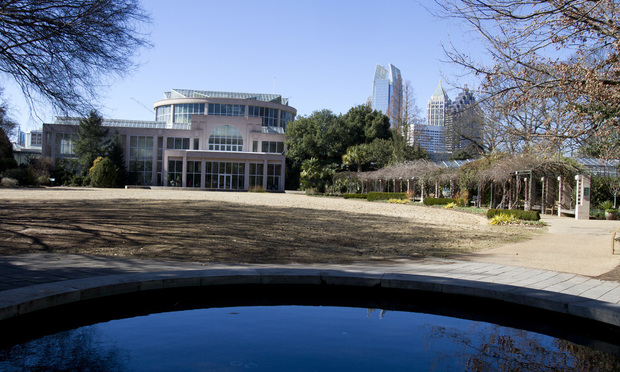Guns in the Garden: Reversal Issued in Open Carry Ban at Atlanta Botanical Garden
One justice suggested that a 2014 amendment to the state's gun law at the heart of the high court's reversal didn't pass constitutional muster, but the author of the unanimous reversal said Second Amendment and property rights questions did not govern the high court's decision.
October 07, 2019 at 03:00 PM
7 minute read
 Atlanta Botanical Garden, Fuqua Conservatory. (Photo: John Disney/ALM)
Atlanta Botanical Garden, Fuqua Conservatory. (Photo: John Disney/ALM)
The Georgia Supreme Court on Monday breathed life back into a gun-rights advocacy group's fight to openly carry firearms in the gun-free Atlanta Botanical Garden.
The high court for the second time reversed rulings by the Georgia Court of Appeals and a Fulton County trial judge affirming the right of the botanical garden—a private nonprofit organization that holds a 50-year lease from the City of Atlanta—to bar people from bringing guns on the premises and to concerts and other events.
But the unanimous opinion, written by Justice Charles Bethel, included a separate concurrence by Justice Nels Peterson, suggesting that a 2014 amendment to Georgia's gun-carry laws, on which the appeal rested, is unconstitutional—at least for leases that were executed before it took effect.
 Justice Nels Peterson, Supreme Court of Georgia. (Photo: John Disney/ALM)
Justice Nels Peterson, Supreme Court of Georgia. (Photo: John Disney/ALM)Peterson said the 2014 amendment "retroactively destroyed" the property rights of private individuals or entities leasing property from public groups that otherwise would have allowed them to exclude people from carrying firearms on the leased properties.
The Georgia Constitution includes both a "a wide range of complementary protections for private property rights" and a prohibition on retroactive laws, Peterson said.
"The property rights conferred by a lease are not merely a public right available to all, but the sort of private, vested rights that the government may not retroactively impair," he found. "The right to exclude other persons … is an essential element of property rights."
All the justices, including Peterson, concurred in Bethel's opinion, except Chief Justice Harold Melton, who didn't participate, and Justice John Ellington, who was disqualified.
Attorneys David Carpenter and Jim Grant at the Atlanta offices of Alston & Bird, who represent the botanical garden, referred media inquiries to the client's staff.
Atlanta Botanical Garden president and CEO Mary Pat Matheson said in a written statement the organization appreciates "the continued opportunity" to be heard in court over whether the garden can remain "a gun-free zone."
"As of today, the Garden remains gun-free," she said, adding that the organization "is neither anti-gun nor pro-gun, but pro-Garden. We celebrate families and children, and create incredible experiences for the hundreds of thousands of guests who visit the garden annually."
Dawsonville attorney John Monroe—a founder, board member and corporate officer of GeorgiaCarry who represents Evans—said he is confident that a careful review of the garden's lease with the city will make it clear that the garden is prohibited by state law from banning guns on its premises.
"We never argued it as a Second-Amendment issue," said Monroe, who said he helped to write the 2014 amendment that forms the basis for the high court's reversal. "It was really about an interpretation of state law. … The idea was, if you are going to lease public property, you should not have the same right that private property owners have to exclude firearms."
Monroe said the 2014 amendment is in keeping with a separate state law barring cities and counties from introducing or enforcing their own gun regulations.
GeorgiaCarry sued the botanical garden five years ago after one of its members twice visited the venue in 2014 while openly carrying a gun in a holster on his waistband. On his second visit, police escorted member Phillip Evans from the premises. GeorgiaCarry subsequently filed suit challenging the garden's gun ban. A Fulton County judge dismissed the case, but the high court reversed, claiming the dismissal was improper.
Evans was a plaintiff in another 2014 case against the Gwinnett County school system intended overturn a firearms ban on public school campuses and at school events. He wanted to be able to keep his gun with him at all times without restriction "in case of confrontation," according to the complaint.
In remanding the Evans case against the botanical garden for further review, Bethel contended the ultimate resolution of the case brought against the garden by GeorgiaCarry.Org "does not turn on an interpretation or understanding" of the Second Amendment or a similar provision in the Georgia Constitution. Bethel also found that the appeal did not require the high court to determine whether the 2014 gun law amendment "runs afoul" of individual property rights codified in both the U.S. and Georgia constitutions. The opinion does not address Peterson's questions, he said.
Instead, the high court issued a narrow technical ruling requiring the lower courts to scrutinize the precise language of the garden's lease and what constitutes "private property."
The Court of Appeals earlier ruled that a private organization leasing property owned by a municipality can bar firearms from being carried on the premises, affirming the Fulton court's grant of summary judgment to the garden. But Bethel said the lease is not in the appeal record. And a determination as to whether the garden, because it leases the land from the city, is private or public property "requires an examination" of the provisions of its 50-year lease, he said.
The 2014 amendment to Georgia's gun law states that private property owners or individuals in legal control of private property through a lease, contract or other licensing or rental agreement shall have the right to exclude or eject a person in possession of a weapon or long gun on their private property. In passing the amendment, Bethel said, "The General Assembly limited the right to exclude the carrying of firearms to only those who own or lease 'private property.'"
Bethel's opinion calls for a determination as to whether the lease is a "usufruct"—a term referring to a license to use the leased property for "a particular act or series of acts on land of another without possessing any estate or interest"—or whether the tenant holds "an estate interest" in the leased property, meaning the tenant is considered the property owner for the duration of the lease.
"If the lease does not grant an estate to the Garden, the Garden merely has a usufruct," Bethel said. "If that is the case, throughout the term of the Garden's lease with the city, the leased premises has never been anything other than public property because the present estate in the property has always been held by the City of Atlanta, a public entity."
"However, it is quite possible that the 50-year lease between the City and the Garden created an estate for years that is presently held by the Garden," he continued. "Where the term of a lease is for a period greater than five years, a rebuttable presumption arises that the parties intended to create an estate for years rather than a usufruct."
The trial court "must determine whether the specific lease in question creates an estate for years or a usufruct," Bethel said. "That has not been done in this case and cannot be done on the record before us."
This content has been archived. It is available through our partners, LexisNexis® and Bloomberg Law.
To view this content, please continue to their sites.
Not a Lexis Subscriber?
Subscribe Now
Not a Bloomberg Law Subscriber?
Subscribe Now
NOT FOR REPRINT
© 2025 ALM Global, LLC, All Rights Reserved. Request academic re-use from www.copyright.com. All other uses, submit a request to [email protected]. For more information visit Asset & Logo Licensing.
You Might Like
View All
Georgia's Governor Details Spending Plans but Not His Top Priority of Lawsuit Reform
6 minute read
Fourth Circuit Seeks More Legal Briefs in Unresolved N.C. Supreme Court Election
4 minute read
Fulton DA Seeks to Overturn Her Disqualification From Trump Georgia Election Case
3 minute readTrending Stories
Who Got The Work
J. Brugh Lower of Gibbons has entered an appearance for industrial equipment supplier Devco Corporation in a pending trademark infringement lawsuit. The suit, accusing the defendant of selling knock-off Graco products, was filed Dec. 18 in New Jersey District Court by Rivkin Radler on behalf of Graco Inc. and Graco Minnesota. The case, assigned to U.S. District Judge Zahid N. Quraishi, is 3:24-cv-11294, Graco Inc. et al v. Devco Corporation.
Who Got The Work
Rebecca Maller-Stein and Kent A. Yalowitz of Arnold & Porter Kaye Scholer have entered their appearances for Hanaco Venture Capital and its executives, Lior Prosor and David Frankel, in a pending securities lawsuit. The action, filed on Dec. 24 in New York Southern District Court by Zell, Aron & Co. on behalf of Goldeneye Advisors, accuses the defendants of negligently and fraudulently managing the plaintiff's $1 million investment. The case, assigned to U.S. District Judge Vernon S. Broderick, is 1:24-cv-09918, Goldeneye Advisors, LLC v. Hanaco Venture Capital, Ltd. et al.
Who Got The Work
Attorneys from A&O Shearman has stepped in as defense counsel for Toronto-Dominion Bank and other defendants in a pending securities class action. The suit, filed Dec. 11 in New York Southern District Court by Bleichmar Fonti & Auld, accuses the defendants of concealing the bank's 'pervasive' deficiencies in regards to its compliance with the Bank Secrecy Act and the quality of its anti-money laundering controls. The case, assigned to U.S. District Judge Arun Subramanian, is 1:24-cv-09445, Gonzalez v. The Toronto-Dominion Bank et al.
Who Got The Work
Crown Castle International, a Pennsylvania company providing shared communications infrastructure, has turned to Luke D. Wolf of Gordon Rees Scully Mansukhani to fend off a pending breach-of-contract lawsuit. The court action, filed Nov. 25 in Michigan Eastern District Court by Hooper Hathaway PC on behalf of The Town Residences LLC, accuses Crown Castle of failing to transfer approximately $30,000 in utility payments from T-Mobile in breach of a roof-top lease and assignment agreement. The case, assigned to U.S. District Judge Susan K. Declercq, is 2:24-cv-13131, The Town Residences LLC v. T-Mobile US, Inc. et al.
Who Got The Work
Wilfred P. Coronato and Daniel M. Schwartz of McCarter & English have stepped in as defense counsel to Electrolux Home Products Inc. in a pending product liability lawsuit. The court action, filed Nov. 26 in New York Eastern District Court by Poulos Lopiccolo PC and Nagel Rice LLP on behalf of David Stern, alleges that the defendant's refrigerators’ drawers and shelving repeatedly break and fall apart within months after purchase. The case, assigned to U.S. District Judge Joan M. Azrack, is 2:24-cv-08204, Stern v. Electrolux Home Products, Inc.
Featured Firms
Law Offices of Gary Martin Hays & Associates, P.C.
(470) 294-1674
Law Offices of Mark E. Salomone
(857) 444-6468
Smith & Hassler
(713) 739-1250







